ACC03043 - Directors' Duties & Stakeholder Interests Report
VerifiedAdded on 2023/06/09
|8
|2424
|476
Report
AI Summary
This report, prepared for the AICD, examines the responsibilities of directors towards various stakeholders, beyond just shareholders, under the Corporations Act 2001. It discusses the evolving interpretation of directors' duties through case laws like ASIC v Vizard and James Hardie, highlighting the increasing importance of considering the interests of employees, communities, and the environment. The report argues that existing laws provide sufficient flexibility for directors to balance stakeholder interests with the long-term interests of the company, without needing mandatory modifications. It emphasizes the need for a self-regulatory approach where directors genuinely consider stakeholder interests as integral to the company's success, citing the 7-Eleven case as an example of the consequences of neglecting stakeholder concerns. The report concludes that fostering a corporate culture that values stakeholder interests, alongside best practices codes, is more effective than imposing rigid legal obligations.

Corporate Governance 1
Corporate Governance
Corporate Governance
Paraphrase This Document
Need a fresh take? Get an instant paraphrase of this document with our AI Paraphraser
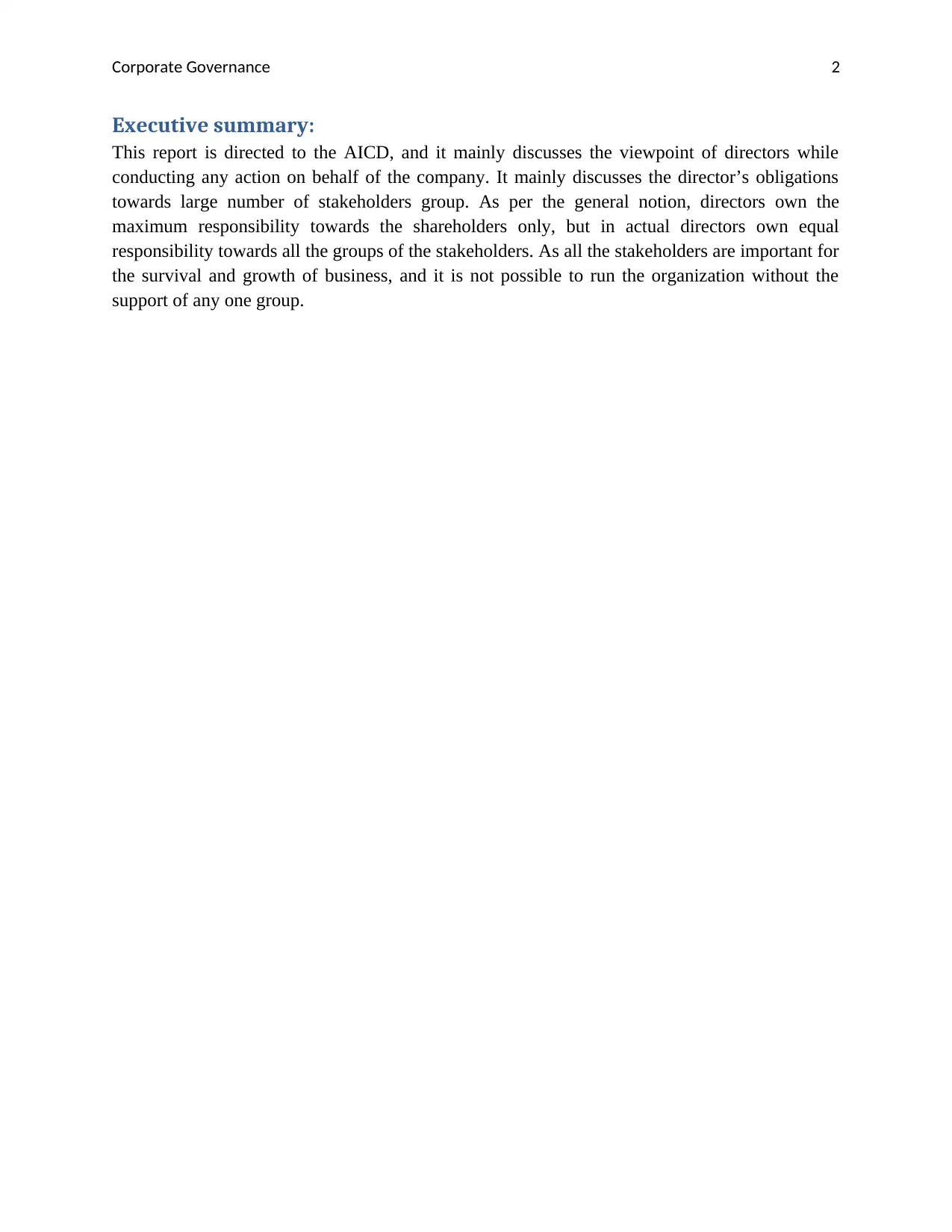
Corporate Governance 2
Executive summary:
This report is directed to the AICD, and it mainly discusses the viewpoint of directors while
conducting any action on behalf of the company. It mainly discusses the director’s obligations
towards large number of stakeholders group. As per the general notion, directors own the
maximum responsibility towards the shareholders only, but in actual directors own equal
responsibility towards all the groups of the stakeholders. As all the stakeholders are important for
the survival and growth of business, and it is not possible to run the organization without the
support of any one group.
Executive summary:
This report is directed to the AICD, and it mainly discusses the viewpoint of directors while
conducting any action on behalf of the company. It mainly discusses the director’s obligations
towards large number of stakeholders group. As per the general notion, directors own the
maximum responsibility towards the shareholders only, but in actual directors own equal
responsibility towards all the groups of the stakeholders. As all the stakeholders are important for
the survival and growth of business, and it is not possible to run the organization without the
support of any one group.

Corporate Governance 3
Contents
Executive summary:....................................................................................................................................2
Introduction:...............................................................................................................................................4
Discussion:...................................................................................................................................................4
Conclusion:..................................................................................................................................................7
References:..................................................................................................................................................8
Contents
Executive summary:....................................................................................................................................2
Introduction:...............................................................................................................................................4
Discussion:...................................................................................................................................................4
Conclusion:..................................................................................................................................................7
References:..................................................................................................................................................8
⊘ This is a preview!⊘
Do you want full access?
Subscribe today to unlock all pages.

Trusted by 1+ million students worldwide
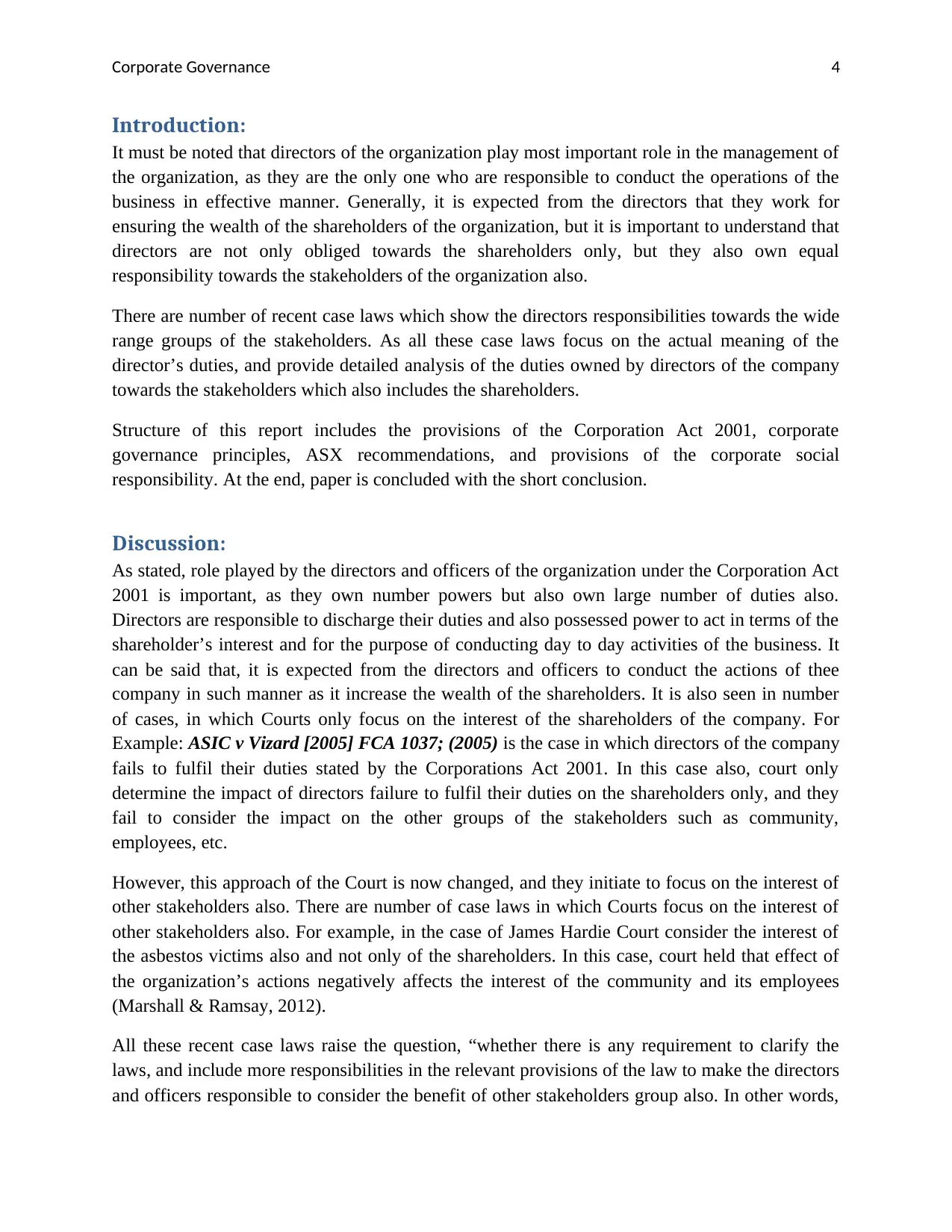
Corporate Governance 4
Introduction:
It must be noted that directors of the organization play most important role in the management of
the organization, as they are the only one who are responsible to conduct the operations of the
business in effective manner. Generally, it is expected from the directors that they work for
ensuring the wealth of the shareholders of the organization, but it is important to understand that
directors are not only obliged towards the shareholders only, but they also own equal
responsibility towards the stakeholders of the organization also.
There are number of recent case laws which show the directors responsibilities towards the wide
range groups of the stakeholders. As all these case laws focus on the actual meaning of the
director’s duties, and provide detailed analysis of the duties owned by directors of the company
towards the stakeholders which also includes the shareholders.
Structure of this report includes the provisions of the Corporation Act 2001, corporate
governance principles, ASX recommendations, and provisions of the corporate social
responsibility. At the end, paper is concluded with the short conclusion.
Discussion:
As stated, role played by the directors and officers of the organization under the Corporation Act
2001 is important, as they own number powers but also own large number of duties also.
Directors are responsible to discharge their duties and also possessed power to act in terms of the
shareholder’s interest and for the purpose of conducting day to day activities of the business. It
can be said that, it is expected from the directors and officers to conduct the actions of thee
company in such manner as it increase the wealth of the shareholders. It is also seen in number
of cases, in which Courts only focus on the interest of the shareholders of the company. For
Example: ASIC v Vizard [2005] FCA 1037; (2005) is the case in which directors of the company
fails to fulfil their duties stated by the Corporations Act 2001. In this case also, court only
determine the impact of directors failure to fulfil their duties on the shareholders only, and they
fail to consider the impact on the other groups of the stakeholders such as community,
employees, etc.
However, this approach of the Court is now changed, and they initiate to focus on the interest of
other stakeholders also. There are number of case laws in which Courts focus on the interest of
other stakeholders also. For example, in the case of James Hardie Court consider the interest of
the asbestos victims also and not only of the shareholders. In this case, court held that effect of
the organization’s actions negatively affects the interest of the community and its employees
(Marshall & Ramsay, 2012).
All these recent case laws raise the question, “whether there is any requirement to clarify the
laws, and include more responsibilities in the relevant provisions of the law to make the directors
and officers responsible to consider the benefit of other stakeholders group also. In other words,
Introduction:
It must be noted that directors of the organization play most important role in the management of
the organization, as they are the only one who are responsible to conduct the operations of the
business in effective manner. Generally, it is expected from the directors that they work for
ensuring the wealth of the shareholders of the organization, but it is important to understand that
directors are not only obliged towards the shareholders only, but they also own equal
responsibility towards the stakeholders of the organization also.
There are number of recent case laws which show the directors responsibilities towards the wide
range groups of the stakeholders. As all these case laws focus on the actual meaning of the
director’s duties, and provide detailed analysis of the duties owned by directors of the company
towards the stakeholders which also includes the shareholders.
Structure of this report includes the provisions of the Corporation Act 2001, corporate
governance principles, ASX recommendations, and provisions of the corporate social
responsibility. At the end, paper is concluded with the short conclusion.
Discussion:
As stated, role played by the directors and officers of the organization under the Corporation Act
2001 is important, as they own number powers but also own large number of duties also.
Directors are responsible to discharge their duties and also possessed power to act in terms of the
shareholder’s interest and for the purpose of conducting day to day activities of the business. It
can be said that, it is expected from the directors and officers to conduct the actions of thee
company in such manner as it increase the wealth of the shareholders. It is also seen in number
of cases, in which Courts only focus on the interest of the shareholders of the company. For
Example: ASIC v Vizard [2005] FCA 1037; (2005) is the case in which directors of the company
fails to fulfil their duties stated by the Corporations Act 2001. In this case also, court only
determine the impact of directors failure to fulfil their duties on the shareholders only, and they
fail to consider the impact on the other groups of the stakeholders such as community,
employees, etc.
However, this approach of the Court is now changed, and they initiate to focus on the interest of
other stakeholders also. There are number of case laws in which Courts focus on the interest of
other stakeholders also. For example, in the case of James Hardie Court consider the interest of
the asbestos victims also and not only of the shareholders. In this case, court held that effect of
the organization’s actions negatively affects the interest of the community and its employees
(Marshall & Ramsay, 2012).
All these recent case laws raise the question, “whether there is any requirement to clarify the
laws, and include more responsibilities in the relevant provisions of the law to make the directors
and officers responsible to consider the benefit of other stakeholders group also. In other words,
Paraphrase This Document
Need a fresh take? Get an instant paraphrase of this document with our AI Paraphraser
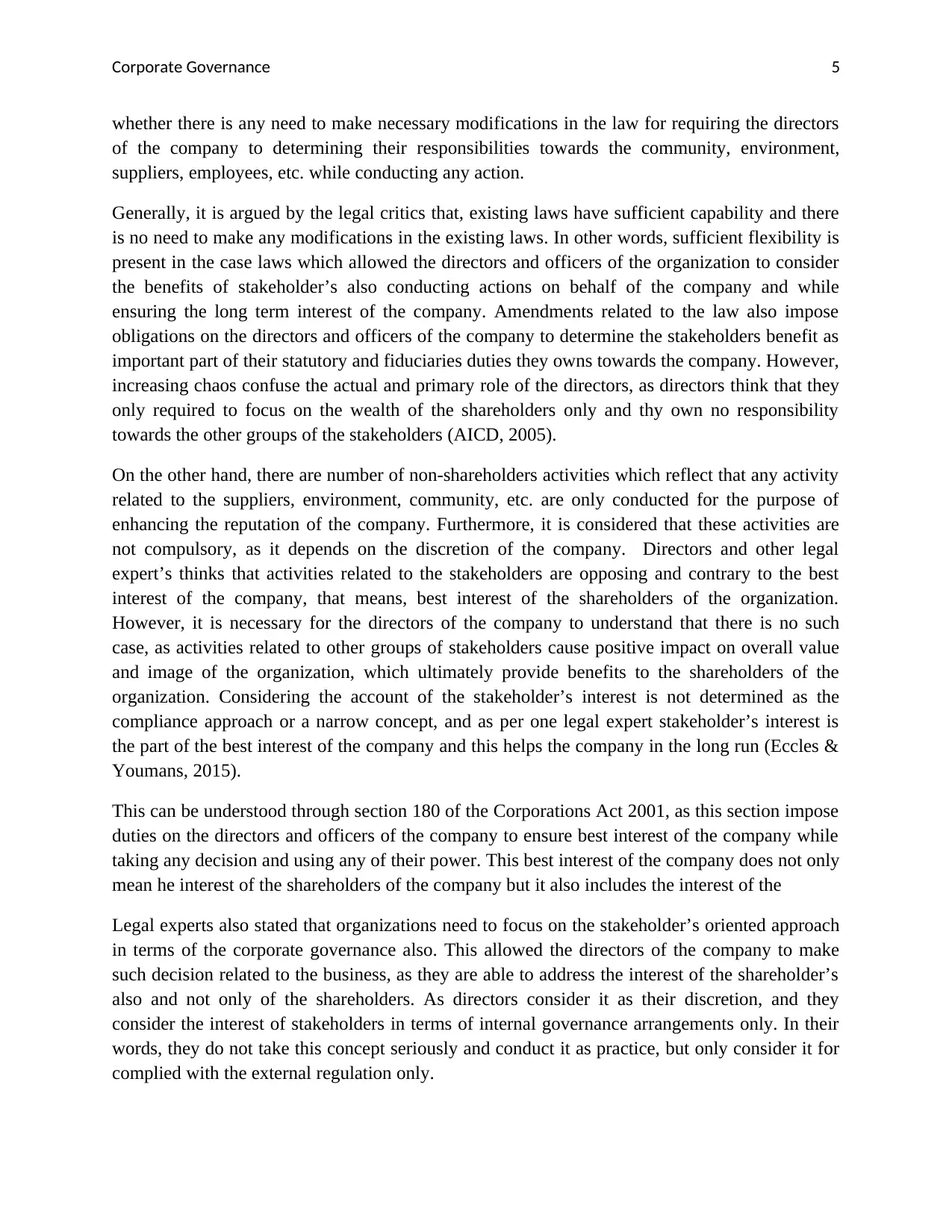
Corporate Governance 5
whether there is any need to make necessary modifications in the law for requiring the directors
of the company to determining their responsibilities towards the community, environment,
suppliers, employees, etc. while conducting any action.
Generally, it is argued by the legal critics that, existing laws have sufficient capability and there
is no need to make any modifications in the existing laws. In other words, sufficient flexibility is
present in the case laws which allowed the directors and officers of the organization to consider
the benefits of stakeholder’s also conducting actions on behalf of the company and while
ensuring the long term interest of the company. Amendments related to the law also impose
obligations on the directors and officers of the company to determine the stakeholders benefit as
important part of their statutory and fiduciaries duties they owns towards the company. However,
increasing chaos confuse the actual and primary role of the directors, as directors think that they
only required to focus on the wealth of the shareholders only and thy own no responsibility
towards the other groups of the stakeholders (AICD, 2005).
On the other hand, there are number of non-shareholders activities which reflect that any activity
related to the suppliers, environment, community, etc. are only conducted for the purpose of
enhancing the reputation of the company. Furthermore, it is considered that these activities are
not compulsory, as it depends on the discretion of the company. Directors and other legal
expert’s thinks that activities related to the stakeholders are opposing and contrary to the best
interest of the company, that means, best interest of the shareholders of the organization.
However, it is necessary for the directors of the company to understand that there is no such
case, as activities related to other groups of stakeholders cause positive impact on overall value
and image of the organization, which ultimately provide benefits to the shareholders of the
organization. Considering the account of the stakeholder’s interest is not determined as the
compliance approach or a narrow concept, and as per one legal expert stakeholder’s interest is
the part of the best interest of the company and this helps the company in the long run (Eccles &
Youmans, 2015).
This can be understood through section 180 of the Corporations Act 2001, as this section impose
duties on the directors and officers of the company to ensure best interest of the company while
taking any decision and using any of their power. This best interest of the company does not only
mean he interest of the shareholders of the company but it also includes the interest of the
Legal experts also stated that organizations need to focus on the stakeholder’s oriented approach
in terms of the corporate governance also. This allowed the directors of the company to make
such decision related to the business, as they are able to address the interest of the shareholder’s
also and not only of the shareholders. As directors consider it as their discretion, and they
consider the interest of stakeholders in terms of internal governance arrangements only. In their
words, they do not take this concept seriously and conduct it as practice, but only consider it for
complied with the external regulation only.
whether there is any need to make necessary modifications in the law for requiring the directors
of the company to determining their responsibilities towards the community, environment,
suppliers, employees, etc. while conducting any action.
Generally, it is argued by the legal critics that, existing laws have sufficient capability and there
is no need to make any modifications in the existing laws. In other words, sufficient flexibility is
present in the case laws which allowed the directors and officers of the organization to consider
the benefits of stakeholder’s also conducting actions on behalf of the company and while
ensuring the long term interest of the company. Amendments related to the law also impose
obligations on the directors and officers of the company to determine the stakeholders benefit as
important part of their statutory and fiduciaries duties they owns towards the company. However,
increasing chaos confuse the actual and primary role of the directors, as directors think that they
only required to focus on the wealth of the shareholders only and thy own no responsibility
towards the other groups of the stakeholders (AICD, 2005).
On the other hand, there are number of non-shareholders activities which reflect that any activity
related to the suppliers, environment, community, etc. are only conducted for the purpose of
enhancing the reputation of the company. Furthermore, it is considered that these activities are
not compulsory, as it depends on the discretion of the company. Directors and other legal
expert’s thinks that activities related to the stakeholders are opposing and contrary to the best
interest of the company, that means, best interest of the shareholders of the organization.
However, it is necessary for the directors of the company to understand that there is no such
case, as activities related to other groups of stakeholders cause positive impact on overall value
and image of the organization, which ultimately provide benefits to the shareholders of the
organization. Considering the account of the stakeholder’s interest is not determined as the
compliance approach or a narrow concept, and as per one legal expert stakeholder’s interest is
the part of the best interest of the company and this helps the company in the long run (Eccles &
Youmans, 2015).
This can be understood through section 180 of the Corporations Act 2001, as this section impose
duties on the directors and officers of the company to ensure best interest of the company while
taking any decision and using any of their power. This best interest of the company does not only
mean he interest of the shareholders of the company but it also includes the interest of the
Legal experts also stated that organizations need to focus on the stakeholder’s oriented approach
in terms of the corporate governance also. This allowed the directors of the company to make
such decision related to the business, as they are able to address the interest of the shareholder’s
also and not only of the shareholders. As directors consider it as their discretion, and they
consider the interest of stakeholders in terms of internal governance arrangements only. In their
words, they do not take this concept seriously and conduct it as practice, but only consider it for
complied with the external regulation only.
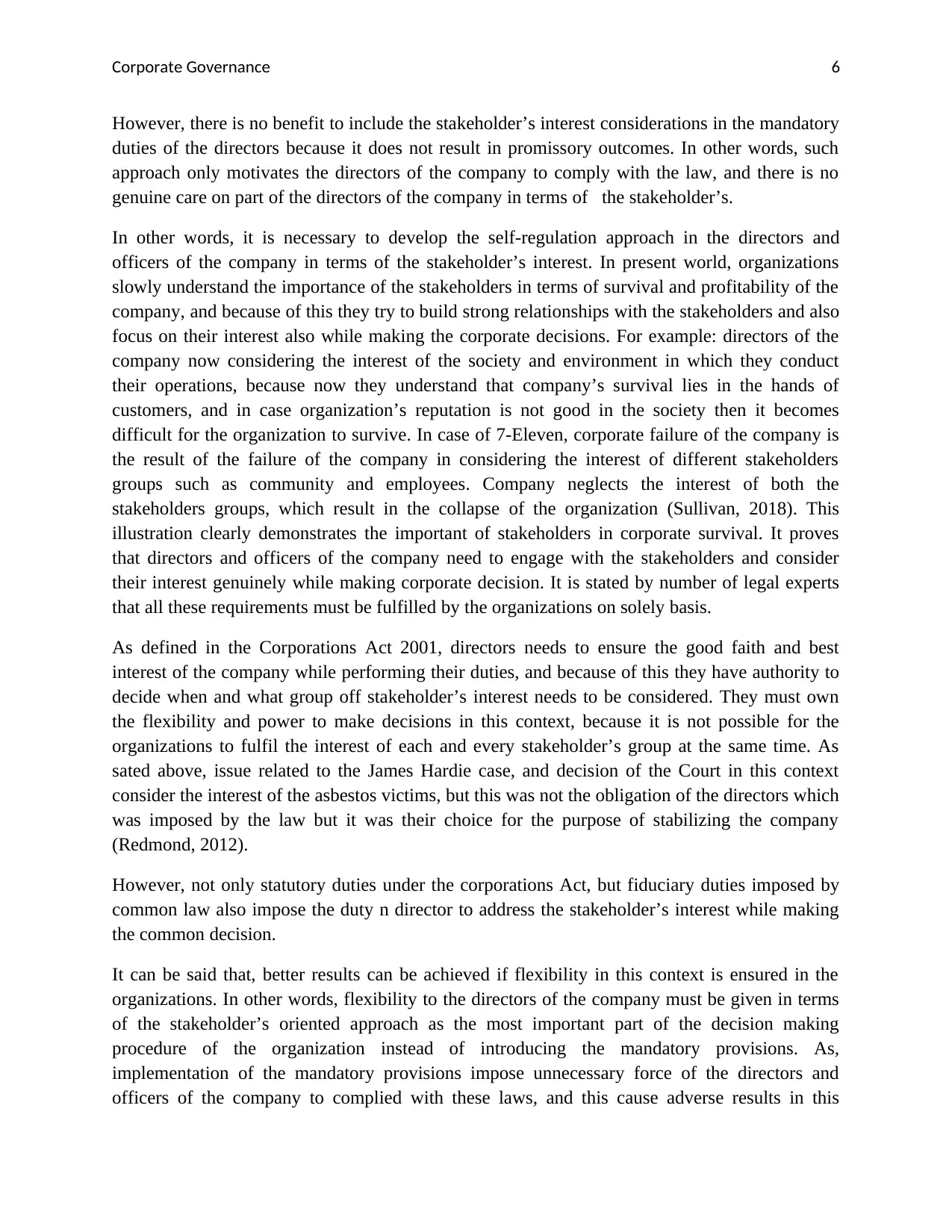
Corporate Governance 6
However, there is no benefit to include the stakeholder’s interest considerations in the mandatory
duties of the directors because it does not result in promissory outcomes. In other words, such
approach only motivates the directors of the company to comply with the law, and there is no
genuine care on part of the directors of the company in terms of the stakeholder’s.
In other words, it is necessary to develop the self-regulation approach in the directors and
officers of the company in terms of the stakeholder’s interest. In present world, organizations
slowly understand the importance of the stakeholders in terms of survival and profitability of the
company, and because of this they try to build strong relationships with the stakeholders and also
focus on their interest also while making the corporate decisions. For example: directors of the
company now considering the interest of the society and environment in which they conduct
their operations, because now they understand that company’s survival lies in the hands of
customers, and in case organization’s reputation is not good in the society then it becomes
difficult for the organization to survive. In case of 7-Eleven, corporate failure of the company is
the result of the failure of the company in considering the interest of different stakeholders
groups such as community and employees. Company neglects the interest of both the
stakeholders groups, which result in the collapse of the organization (Sullivan, 2018). This
illustration clearly demonstrates the important of stakeholders in corporate survival. It proves
that directors and officers of the company need to engage with the stakeholders and consider
their interest genuinely while making corporate decision. It is stated by number of legal experts
that all these requirements must be fulfilled by the organizations on solely basis.
As defined in the Corporations Act 2001, directors needs to ensure the good faith and best
interest of the company while performing their duties, and because of this they have authority to
decide when and what group off stakeholder’s interest needs to be considered. They must own
the flexibility and power to make decisions in this context, because it is not possible for the
organizations to fulfil the interest of each and every stakeholder’s group at the same time. As
sated above, issue related to the James Hardie case, and decision of the Court in this context
consider the interest of the asbestos victims, but this was not the obligation of the directors which
was imposed by the law but it was their choice for the purpose of stabilizing the company
(Redmond, 2012).
However, not only statutory duties under the corporations Act, but fiduciary duties imposed by
common law also impose the duty n director to address the stakeholder’s interest while making
the common decision.
It can be said that, better results can be achieved if flexibility in this context is ensured in the
organizations. In other words, flexibility to the directors of the company must be given in terms
of the stakeholder’s oriented approach as the most important part of the decision making
procedure of the organization instead of introducing the mandatory provisions. As,
implementation of the mandatory provisions impose unnecessary force of the directors and
officers of the company to complied with these laws, and this cause adverse results in this
However, there is no benefit to include the stakeholder’s interest considerations in the mandatory
duties of the directors because it does not result in promissory outcomes. In other words, such
approach only motivates the directors of the company to comply with the law, and there is no
genuine care on part of the directors of the company in terms of the stakeholder’s.
In other words, it is necessary to develop the self-regulation approach in the directors and
officers of the company in terms of the stakeholder’s interest. In present world, organizations
slowly understand the importance of the stakeholders in terms of survival and profitability of the
company, and because of this they try to build strong relationships with the stakeholders and also
focus on their interest also while making the corporate decisions. For example: directors of the
company now considering the interest of the society and environment in which they conduct
their operations, because now they understand that company’s survival lies in the hands of
customers, and in case organization’s reputation is not good in the society then it becomes
difficult for the organization to survive. In case of 7-Eleven, corporate failure of the company is
the result of the failure of the company in considering the interest of different stakeholders
groups such as community and employees. Company neglects the interest of both the
stakeholders groups, which result in the collapse of the organization (Sullivan, 2018). This
illustration clearly demonstrates the important of stakeholders in corporate survival. It proves
that directors and officers of the company need to engage with the stakeholders and consider
their interest genuinely while making corporate decision. It is stated by number of legal experts
that all these requirements must be fulfilled by the organizations on solely basis.
As defined in the Corporations Act 2001, directors needs to ensure the good faith and best
interest of the company while performing their duties, and because of this they have authority to
decide when and what group off stakeholder’s interest needs to be considered. They must own
the flexibility and power to make decisions in this context, because it is not possible for the
organizations to fulfil the interest of each and every stakeholder’s group at the same time. As
sated above, issue related to the James Hardie case, and decision of the Court in this context
consider the interest of the asbestos victims, but this was not the obligation of the directors which
was imposed by the law but it was their choice for the purpose of stabilizing the company
(Redmond, 2012).
However, not only statutory duties under the corporations Act, but fiduciary duties imposed by
common law also impose the duty n director to address the stakeholder’s interest while making
the common decision.
It can be said that, better results can be achieved if flexibility in this context is ensured in the
organizations. In other words, flexibility to the directors of the company must be given in terms
of the stakeholder’s oriented approach as the most important part of the decision making
procedure of the organization instead of introducing the mandatory provisions. As,
implementation of the mandatory provisions impose unnecessary force of the directors and
officers of the company to complied with these laws, and this cause adverse results in this
⊘ This is a preview!⊘
Do you want full access?
Subscribe today to unlock all pages.

Trusted by 1+ million students worldwide
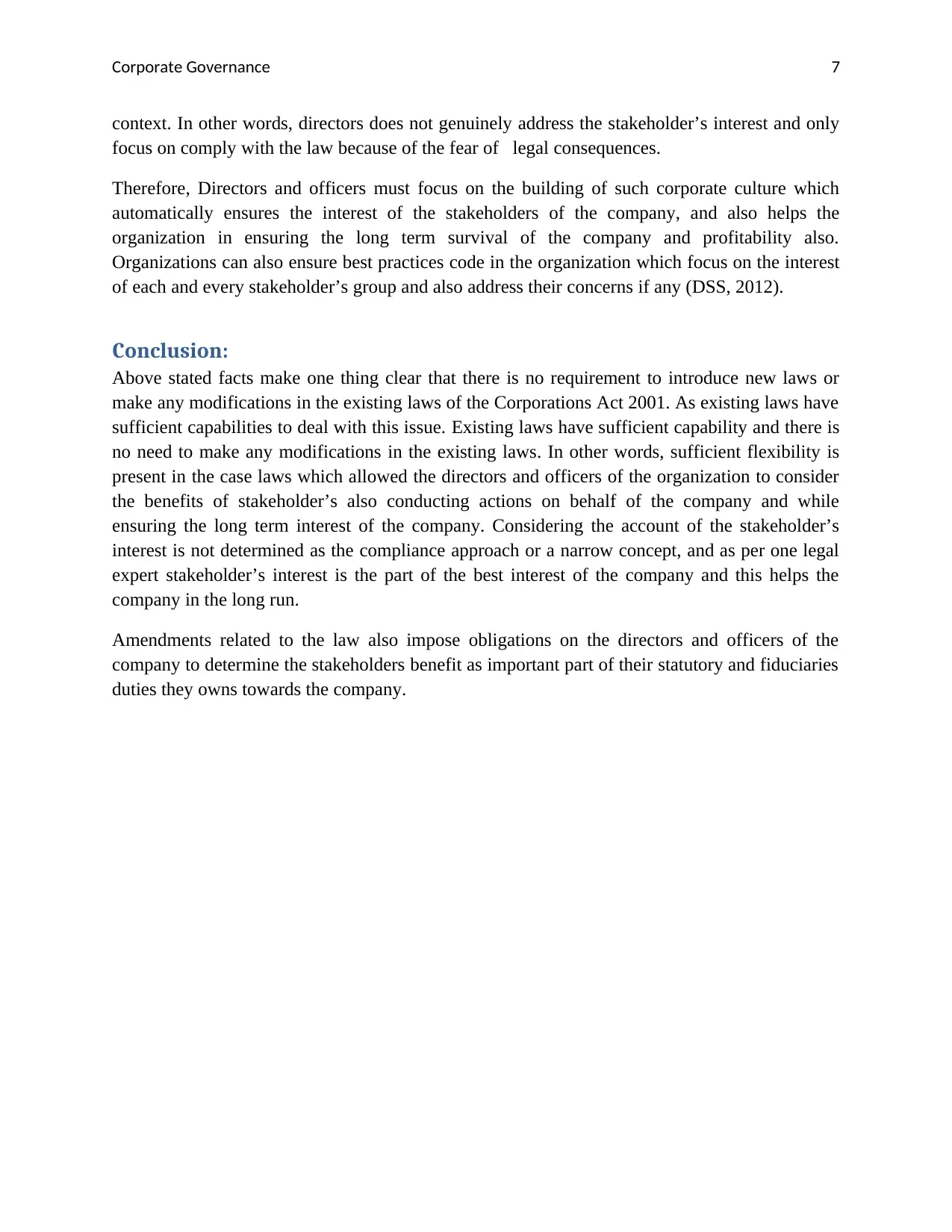
Corporate Governance 7
context. In other words, directors does not genuinely address the stakeholder’s interest and only
focus on comply with the law because of the fear of legal consequences.
Therefore, Directors and officers must focus on the building of such corporate culture which
automatically ensures the interest of the stakeholders of the company, and also helps the
organization in ensuring the long term survival of the company and profitability also.
Organizations can also ensure best practices code in the organization which focus on the interest
of each and every stakeholder’s group and also address their concerns if any (DSS, 2012).
Conclusion:
Above stated facts make one thing clear that there is no requirement to introduce new laws or
make any modifications in the existing laws of the Corporations Act 2001. As existing laws have
sufficient capabilities to deal with this issue. Existing laws have sufficient capability and there is
no need to make any modifications in the existing laws. In other words, sufficient flexibility is
present in the case laws which allowed the directors and officers of the organization to consider
the benefits of stakeholder’s also conducting actions on behalf of the company and while
ensuring the long term interest of the company. Considering the account of the stakeholder’s
interest is not determined as the compliance approach or a narrow concept, and as per one legal
expert stakeholder’s interest is the part of the best interest of the company and this helps the
company in the long run.
Amendments related to the law also impose obligations on the directors and officers of the
company to determine the stakeholders benefit as important part of their statutory and fiduciaries
duties they owns towards the company.
context. In other words, directors does not genuinely address the stakeholder’s interest and only
focus on comply with the law because of the fear of legal consequences.
Therefore, Directors and officers must focus on the building of such corporate culture which
automatically ensures the interest of the stakeholders of the company, and also helps the
organization in ensuring the long term survival of the company and profitability also.
Organizations can also ensure best practices code in the organization which focus on the interest
of each and every stakeholder’s group and also address their concerns if any (DSS, 2012).
Conclusion:
Above stated facts make one thing clear that there is no requirement to introduce new laws or
make any modifications in the existing laws of the Corporations Act 2001. As existing laws have
sufficient capabilities to deal with this issue. Existing laws have sufficient capability and there is
no need to make any modifications in the existing laws. In other words, sufficient flexibility is
present in the case laws which allowed the directors and officers of the organization to consider
the benefits of stakeholder’s also conducting actions on behalf of the company and while
ensuring the long term interest of the company. Considering the account of the stakeholder’s
interest is not determined as the compliance approach or a narrow concept, and as per one legal
expert stakeholder’s interest is the part of the best interest of the company and this helps the
company in the long run.
Amendments related to the law also impose obligations on the directors and officers of the
company to determine the stakeholders benefit as important part of their statutory and fiduciaries
duties they owns towards the company.
Paraphrase This Document
Need a fresh take? Get an instant paraphrase of this document with our AI Paraphraser
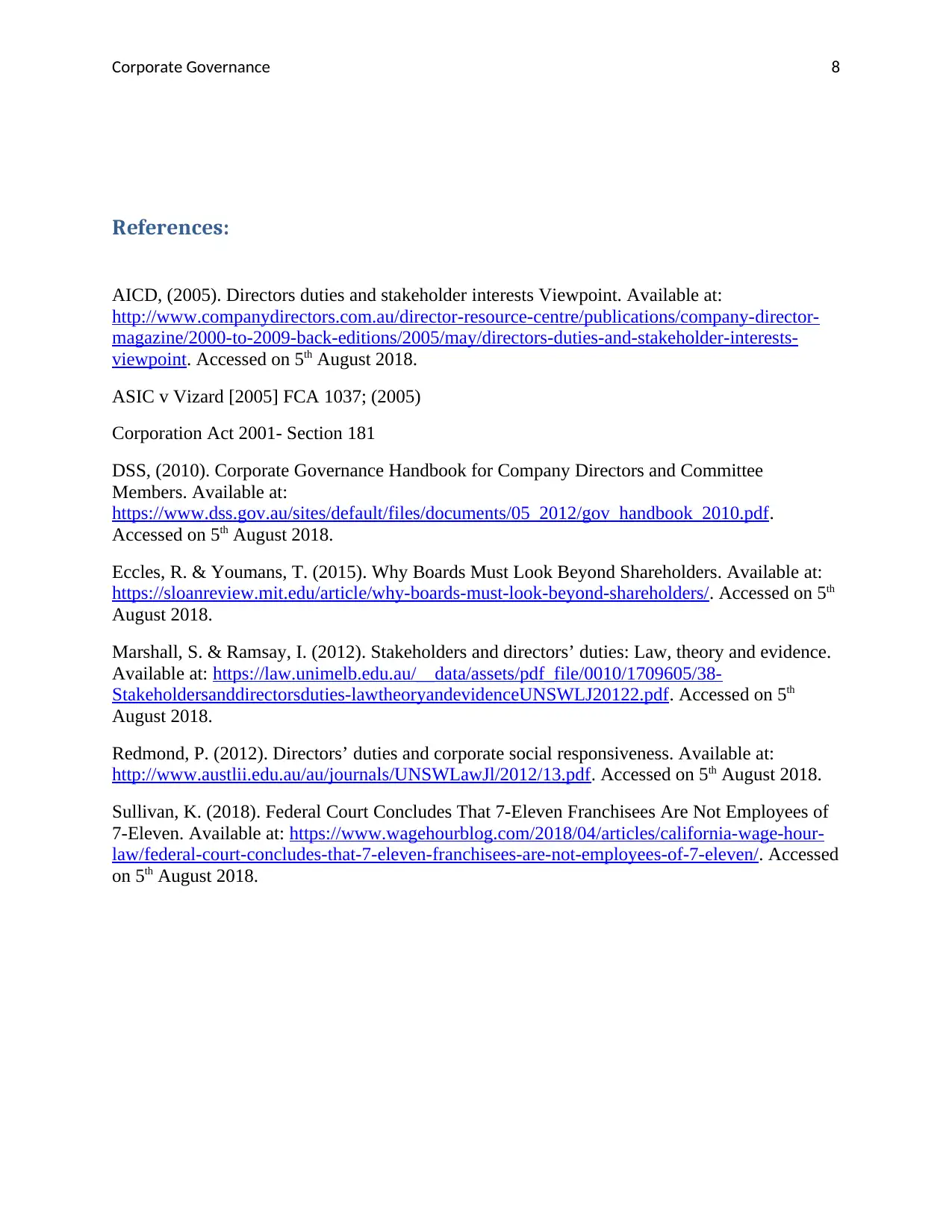
Corporate Governance 8
References:
AICD, (2005). Directors duties and stakeholder interests Viewpoint. Available at:
http://www.companydirectors.com.au/director-resource-centre/publications/company-director-
magazine/2000-to-2009-back-editions/2005/may/directors-duties-and-stakeholder-interests-
viewpoint. Accessed on 5th August 2018.
ASIC v Vizard [2005] FCA 1037; (2005)
Corporation Act 2001- Section 181
DSS, (2010). Corporate Governance Handbook for Company Directors and Committee
Members. Available at:
https://www.dss.gov.au/sites/default/files/documents/05_2012/gov_handbook_2010.pdf.
Accessed on 5th August 2018.
Eccles, R. & Youmans, T. (2015). Why Boards Must Look Beyond Shareholders. Available at:
https://sloanreview.mit.edu/article/why-boards-must-look-beyond-shareholders/. Accessed on 5th
August 2018.
Marshall, S. & Ramsay, I. (2012). Stakeholders and directors’ duties: Law, theory and evidence.
Available at: https://law.unimelb.edu.au/__data/assets/pdf_file/0010/1709605/38-
Stakeholdersanddirectorsduties-lawtheoryandevidenceUNSWLJ20122.pdf. Accessed on 5th
August 2018.
Redmond, P. (2012). Directors’ duties and corporate social responsiveness. Available at:
http://www.austlii.edu.au/au/journals/UNSWLawJl/2012/13.pdf. Accessed on 5th August 2018.
Sullivan, K. (2018). Federal Court Concludes That 7-Eleven Franchisees Are Not Employees of
7-Eleven. Available at: https://www.wagehourblog.com/2018/04/articles/california-wage-hour-
law/federal-court-concludes-that-7-eleven-franchisees-are-not-employees-of-7-eleven/. Accessed
on 5th August 2018.
References:
AICD, (2005). Directors duties and stakeholder interests Viewpoint. Available at:
http://www.companydirectors.com.au/director-resource-centre/publications/company-director-
magazine/2000-to-2009-back-editions/2005/may/directors-duties-and-stakeholder-interests-
viewpoint. Accessed on 5th August 2018.
ASIC v Vizard [2005] FCA 1037; (2005)
Corporation Act 2001- Section 181
DSS, (2010). Corporate Governance Handbook for Company Directors and Committee
Members. Available at:
https://www.dss.gov.au/sites/default/files/documents/05_2012/gov_handbook_2010.pdf.
Accessed on 5th August 2018.
Eccles, R. & Youmans, T. (2015). Why Boards Must Look Beyond Shareholders. Available at:
https://sloanreview.mit.edu/article/why-boards-must-look-beyond-shareholders/. Accessed on 5th
August 2018.
Marshall, S. & Ramsay, I. (2012). Stakeholders and directors’ duties: Law, theory and evidence.
Available at: https://law.unimelb.edu.au/__data/assets/pdf_file/0010/1709605/38-
Stakeholdersanddirectorsduties-lawtheoryandevidenceUNSWLJ20122.pdf. Accessed on 5th
August 2018.
Redmond, P. (2012). Directors’ duties and corporate social responsiveness. Available at:
http://www.austlii.edu.au/au/journals/UNSWLawJl/2012/13.pdf. Accessed on 5th August 2018.
Sullivan, K. (2018). Federal Court Concludes That 7-Eleven Franchisees Are Not Employees of
7-Eleven. Available at: https://www.wagehourblog.com/2018/04/articles/california-wage-hour-
law/federal-court-concludes-that-7-eleven-franchisees-are-not-employees-of-7-eleven/. Accessed
on 5th August 2018.
1 out of 8
Related Documents
Your All-in-One AI-Powered Toolkit for Academic Success.
+13062052269
info@desklib.com
Available 24*7 on WhatsApp / Email
![[object Object]](/_next/static/media/star-bottom.7253800d.svg)
Unlock your academic potential
Copyright © 2020–2026 A2Z Services. All Rights Reserved. Developed and managed by ZUCOL.



